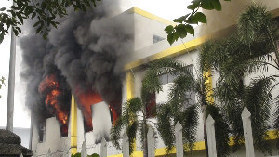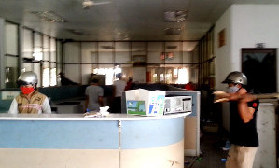 |
 |
| Smoke rises from a fire at a company building in Binh Duong province on May 14. [REUTERS / VNEXPRESS] | A mob ransacks a factory in search of valuables. [REUTERS / VNEXPRESS] |
|
Entrepreneurs ask Vietnam to guarantee safety By Hu Yongqi Wang Guijun, deputy president of the Business Association of China in Vietnam, said many Chinese companies are waiting to see how the situation develops before deciding whether to remain in the country. "Most Chinese companies are looking to the Vietnamese government to provide a safer environment for foreign businesses. Some businesses will talk with Vietnamese officials about security and compensation at a later date, but many have ordered their personnel to return to China," Wang said. The association has more than 400 member companies in 15 or 16 industries such as electrical appliances and textiles. It has worked closely with the Chinese consulate general in Ho Chi Minh City to provide shelter for Chinese nationals who have been housed in a number of hotels downtown, far from the rioting in the suburbs, he said. "Food and other daily necessities are being prepared in advance and we suggest that people go out as little as possible. We will update Chinese managers with the latest news to minimize the risks," he added. |
When the mob stormed the office complex, Jin and about 40 Chinese colleagues were taken to hide in a second-floor room. No one was injured.
"Thanks to our boss and several Vietnamese colleagues, we escaped through the back door of the office and ran to the building of the development zone's administration committee. We laid low in a big conference room for two days, and slept in chairs at night," said Jin.
"Workers from the administration committee provided instant noodles, and the help we were given by our Vietnamese colleagues was extremely moving. They bought hot food and sent it to us. Not every Vietnamese person hates China. In the three years I've lived in the country, I've found the vast majority of Vietnamese people to be honest and very kind hearted," she said.
"I flew back on Thursday and my parents met me at the airport. They rushed up to me and cried and hugged me with all their strength. I told them 'I'm fine. I'm safe now, so don't worry.' I put my arms around them and that was it - I just couldn't hold back the tears," she said.
Jin's parents are now insisting that she stay in China and find a new job. "Honestly speaking, I am a little afraid to go back because of the horrible things I saw, but I've been working in Vietnam since I graduated from college with a major in Vietnamese. What else can I do if I don't return?" she asked.
"A friend who works for a company in Taiwan who is staying on in Hanoi told me that his boss took an optimistic view and said the factory will quickly resume production once conditions improve," she said.
Travel chaos
Jin is one of thousands of Chinese nationals who have fled Vietnam after the escalation of violent protests against China's deployment of an oil rig in the South China Sea.
As the violence spiraled out of control and the risk of serious injury increased, Jin's boss decided to evacuate his staff as quickly as possible, but that was easier said than done.
"We were in one of the worst-affected regions, but for the first two days, it was impossible to buy tickets for direct flights to China. People had no alternative but to fly to other Vietnamese cities or Hong Kong before continuing their journeys," said Jin.
"What was really disappointing was that some airlines took advantage of the chaos to raise their ticket prices. We left in a hurry and didn't have any money, so our boss bought tickets for all of us," she said.
Jin's experience was echoed by an architect surnamed Liao from Chengdu, Sichuan province, who returned to China by train on Sunday.
"Plane tickets from Vietnam to China are in short supply right now. Trains and even buses have been the only options available to most Chinese. The number of passengers at the railway station in Hanoi doubled in just a few days. Most people decided to come home because of safety concerns," she said.
Liao makes several trips to Vietnam every year for work, usually by air. The flight to Hanoi takes about 90 minutes and the tickets are usually discounted.
|
Business shrinks for contractors By Hu Yongqi Chinese contractors, such as Yunnan United Trade Co, have been badly affected by the rioting in Vietnam. Yunnan United has been building ports in Vietnam for more than two decades, but the 2008 global financial crisis saw a drop in contracts that resulted in lower staff numbers. Liu Bo, the company's general manager, said only one Chinese employee has stayed in Hanoi, the Vietnamese capital, while all other staff have moved to Cambodia to work on new projects. "I am in constant contact with my colleague in Hanoi and the company has devised an emergency plan. If he feels he is in danger, my colleague will buy a ticket and come home straightaway," Liu said. In recent years, infrastructure investment has declined in Vietnam, which withdrew from hosting the 18th Asian Games, and Yunnan United has seen fewer opportunities to expand its business in the country. For the company's managers, though, business is not the first priority at the present time. "Personal safety is the most important thing right now. If the disorder continues, the company will probably close the office in Hanoi," Liu said. |
"It usually costs about 1,200 yuan ($192) each way. But now, only the full price (more than 2,000 yuan) is available. Some people paid a lot more because there is a shortage of tickets," Liao said.
A rail ticket from Hanoi to the border with China costs around 100 yuan, but the journey takes half a day. After that, passengers can use buses, but it takes another half-day to travel to Kunming, the capital of Yunnan province.
"Very few people spoke on the train. A few people who knew each other chatted for a short while, but only about their daily lives. The service staff were all Vietnamese and none of the Chinese passengers spoke about politics or anything related to the two countries' relations, avoiding any conflict," said Liao, who studied Vietnamese at a university in the country from 2006 to 2008. Her father has worked in Hanoi for more than two decades.
She said most Vietnamese people are very kind, and she noticed that market vendors didn't charge foreigners a higher price. During her time at the university, her classmates often invited Chinese students to visit their homes.
"Although the security condition in Hanoi is better than in the south of the country, you didn't see as many Chinese people on the streets as before," Liao said, recalling her last few days in the country.
Economic losses
As yet, there is no indication of the scale of the losses suffered by Chinese companies as a result of the violence, but Qi Jianguo, deputy president of the China-Vietnam Friendship Association, estimated they will be huge.
Although he didn't want to name a figure, Qi pointed to the reality of the trading situation. "Total investment from China ranked 15th in terms of inward foreign investment to Vietnam last year, and China is the country's biggest trading partner, showing the importance of bilateral economic cooperation," he said.
According to the General Statistics Office of Vietnam, by April 20, the country had attracted 390 newly licensed projects with registered capital of $3.228 billion - and 18.5 percent came from the Chinese mainland, Hong Kong, Macao and Taiwan.
Wang Guijun, deputy president of the Business Association of China in Vietnam, echoed Qi's comments, saying the scale of the violence has shocked Chinese entrepreneurs and workers. "Confidence won't be restored in a short time because the damage will still be there," he said.
Big businesses won't be the only ones affected though. Liao said the disturbances will result in the suspension of her company's projects in Vietnam for the next two or three months, but she was keen to look on the bright side.
"I don't think the trouble will continue for too long. I see the current situation as a disagreement between two brothers. They may disagree, but that bond is always there," she said.
Contact the author at hena@chinadaily.com.cn
Pu Zhendong and Yang Yang contributed to this story.
